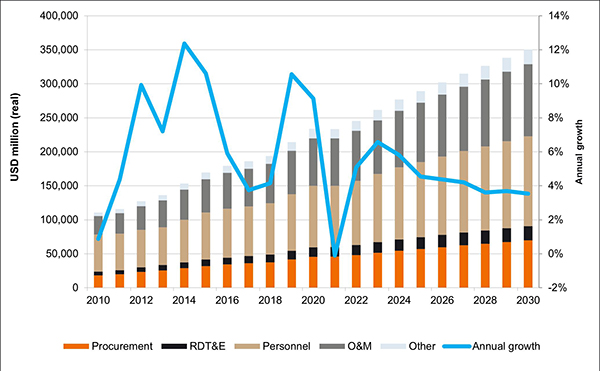China, announced on 5 March, a 7.2% increase in its defence budget for the coming year, up slightly from last year’s 7.1%.
That marks the eighth consecutive year of single-digit increases in what is now the world’s second-largest military budget. Second only to the United States in terms of military spending, China’s budget currently sits at 210 billion euros. That is one-fourth of the amount the US spends on defence. But China’s military spending is over three times higher than India’s.
The announcement was made at China’s rubber-stamp parliament, National People’s Congress (NPC), but analysts say Beijing downplays how much it spends on defence. It was also announced at the meeting that China would pursue a reduced economic growth target of about 5% this year.
Other confirmations are to be that of the president’s third term and also the unveiling of the new premier, China’s equivalent of a prime minister who traditionally oversees the economy and administrative aspects of governance. Li Qiang, one of Mr Xi’s most trusted colleagues, is expected to assume the role.
The hike in defence budget comes at a moment when President Xi Jinping’s ties with Joe Biden are under strain over China’s close ties with Russia, the possible invasion of Taiwan and the recent spy balloon saga.
US officials have also repeatedly warned that China may invade Taiwan in the coming years. China has held ever-growing displays of military force in the air and seas around Taiwan, including the firing of ballistic missiles.
China sees self-ruled Taiwan as a breakaway province that will eventually be under Beijing’s control.
China has justified the increased spending as appropriate and reasonable, claiming that it faces escalating threats. The worsening ties with the US are counterpoised by a warm embrace of President Putin. The security challenges range from Chinese-claimed Taiwan to the US naval and air missions in the disputed South China Sea near Chinese-occupied islands. The responses have included holding unprecedented exercises last August to punish Taiwan for hosting the then US House Speaker Pelosi.
What has baffled the neighbours is Beijing’s assertive and offensive use of its military. The border standoff in eastern Ladakh stands out as unprovoked belligerence.
China now controls the world’s largest navy by size. Its plans are shrouded in secrecy, but the main areas of spending are likely to include the commissioning of its third aircraft carrier, the rapid production of new destroyers and fighter aircraft and investments in space technology and artificial intelligence for missile targeting systems.
“The armed forces should intensify military training and preparedness across the board, develop new military strategic guidance, devote greater energy to training under combat conditions and make well-coordinated efforts to strengthen military work in all directions and domains,” a work report on the government read out by Outgoing Premier Li Keqiang said in a speech to open the 8-day annual session of China’s parliament, the National People’s Congress to nearly 3,000 delegates at the Great Hall of the People in Beijing.

















